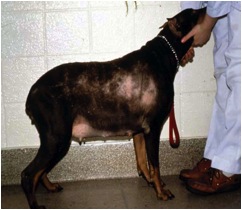Due to the thyroid’s effect on so many different systems, symptoms of hypothyroidism are varied. A common symptom is coat and skin problems. These problems include thinning of the coat, brittle or dry coat, hair loss, skin infection, discoloration of the skin, oily coat, and scaly and smelly skin.
Other common symptoms include obesity, weight loss, lethargy or listlessness, anemia, depression, weakness of the joints, slowing of the heart beat, inconsistent heat cycles, and complication during whelping in mother dogs.
In the Doberman, if hypothyroidism occurs it is usually during middle to old age and is usually due to natural atrophy of the gland or dietary iodine deficiency.
Diagnosing hypothyroidism is usually done with a blood test that measures amounts of thyroid hormone. However, a low thyroid hormone level does not necessarily indicate hypothyroidism. Illness and other problems can cause such deficiencies.
Treatment is fairly straight forward. Thyroid hormone in pill form is available for administration on a daily basis. Dogs under this treatment should be periodically tested to ensure the proper dose is being given.
The Doberman should have their thyroid hormone level checked once a year in an effort to identify this illness early. Doberman owners should also be aware of the symptoms of hypothyroidism and keep an eye out for them.
 |
| A Doberman with Hypothyroidism |
No comments:
Post a Comment